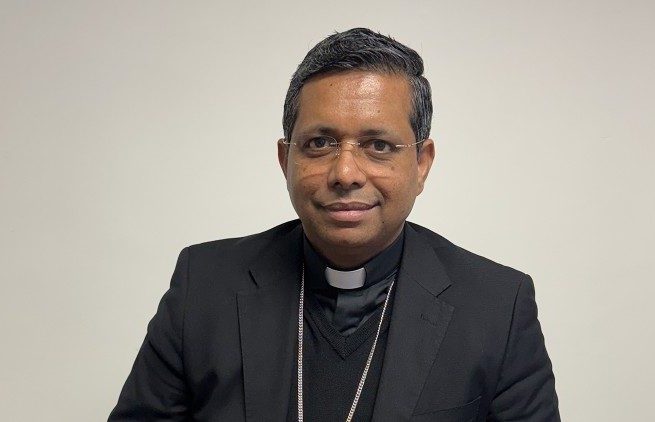Card Koovakad, new prefect of the Dicastery for Interreligious Dialogue
Francis picked the 51-year-old cardinal from Kerala, coordinator of apostolic journeys, to succeed Card Ayuso Guixot who passed away last November. This makes him the first Asian at the helm of the Vatican body. In his first statements, he focuses on the path of fraternity and the form of inculturation developed by Fr Roberto De Nobili in India starting in 1500. The Syro-Malabar Church shared with AsiaNews her joy of a fellow member given this task.
Vatican City (AsiaNews) – Pope Francis chose Card George Koovakad as the new Prefect of the Dicastery for Interreligious Dialogue. A close aide of the pope, the relatively young prelate (51) was elevated to the cardinalship in the last consistory in December 2024.
With this appointment, the Indian prelate becomes the third Asian cardinal at the top of a dicastery of the Roman Curia along with Card Luis Antonio Tagle, from the Philippines, who serves as pro-prefect of the Dicastery for Evangelisation, and Lazarus You Heung-sik, from South Korea, who is the prefect of the Dicastery for the Clergy.
The new prefect also becomes the first Asian ever to lead the Vatican body in charge of relations with non-Christian religions, a dicastery established by Paul VI. This is a major step for the Church as it turns its attention not only to the Muslim world, but also to the great religions of the East.
Born in Kerala in 1973, Card Koovakad is a member of the Syro-Malabar Church. He replaces Card Miguel Ángel Ayuso Guixot, a Spanish Comboni missionary and a great connoisseur of the Arab Islamic world, who passed away on 25 November 2024 at the age of 72.
Currently, the secretary of the Dicastery for Interreligious Dialogue is a fellow South Asian, Fr Indunil Janakaratne Kodithuwakku Kankanamalage, from Sri Lanka.
Ordained a priest in 2004 for the diocese of Changanacherry, Card Koovakad joined the Holy See’s diplomatic service two years later, serving in some nunciatures in Muslim majority countries like Algeria and Iran.
In 2020 he was called to Section for General Affairs of the Secretariat of State, and since 2021 he has overseen the organisation of all Pope Francis's trips, a task he will continue to carry out in parallel with his new position.
The new prefect underlined the significance of these interreligious moments in an official interview with Vatican News, released today to coincide with the announcement of his appointment.
In it, he talks about the important meetings he had during his recent trip to South-east Asia, but also about previous visits to Mongolia and Kazakhstan.
“I trust in the guidance of the Holy Father,” he explained, and “the prayers of all those who continue to dream of a world where religious differences not only coexist peacefully but become essential elements in building peace among peoples. I trust in the guidance of the Holy Father and in the path already wisely traced by those who preceded me.”
Asked about his Indian multireligious and multicultural background, Card Koovakad said, “I like to emphasize that interreligious dialogue in India is traditionally linked to monasticism. As early as 1500, Jesuit Fr Roberto De Nobili adopted the clothing and customs of Indian monks, learned local languages, and sought to assimilate whatever could be valued in these traditions.”
“But what I want to highlight is this attitude of openness, sympathy, and closeness to other traditions. Christian faith is capable of inculturation: Christians are called to be seeds of fraternity for all.”
In a statement to AsiaNews from India, the major archbishop of the Syro-Malabars expressed the joy of the Eastern rite Church to which the new prefect belongs for the choice made by Pope Francis.
“The warmest congratulations to Card George Koovakad, pride and prestige for the Syro-Malabar Church and for the entire Indian Church. There are no words to express our gratitude to the Holy Father for choosing such a young and energetic cardinal from our community to be the Prefect of the Dicastery for Interreligious Dialogue.
“I wish Card. George all the best and God’s blessings in his ministry. It is a task of great responsibility and God will help him, with the divine gifts of the Holy Spirit, so that he can prudently, effectively and affectionately know and grow its service for the good of the Church.”
(Nirmala Carvalho contributed to this article)







.png)










